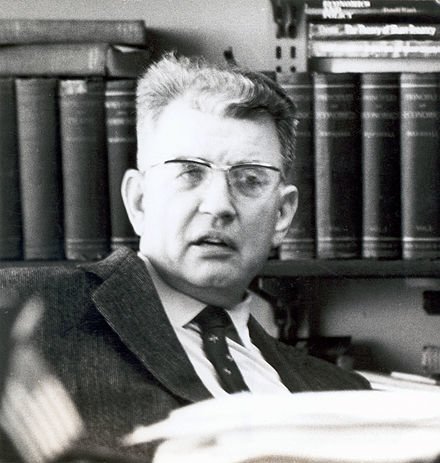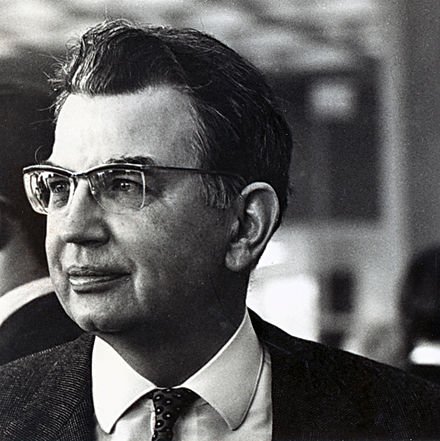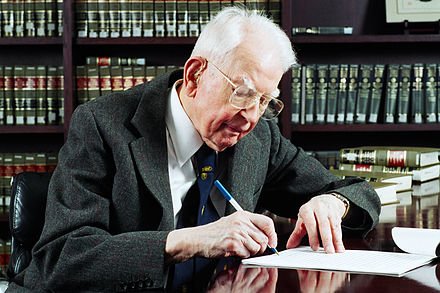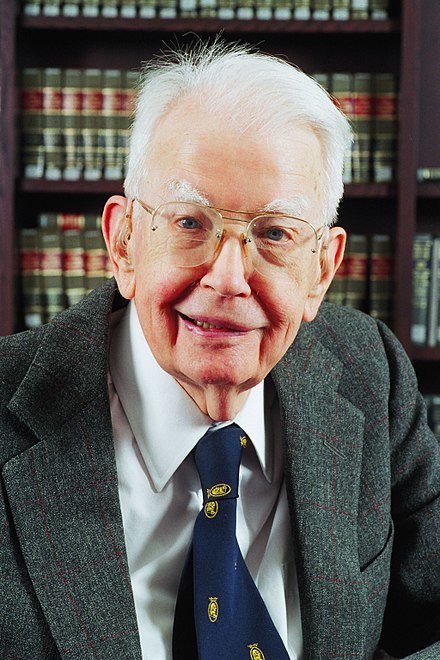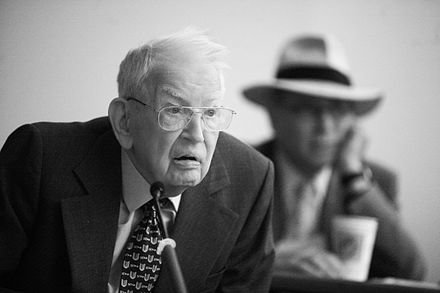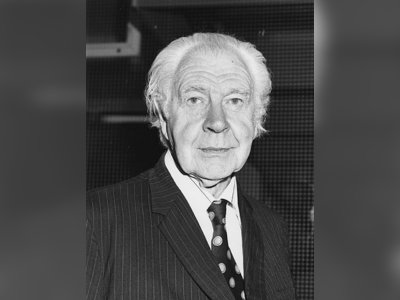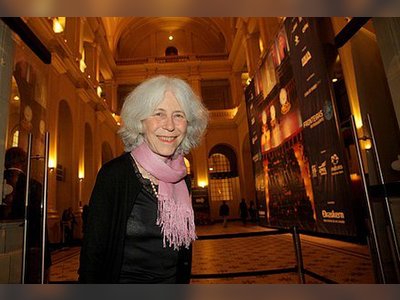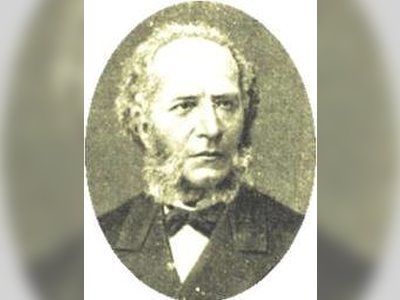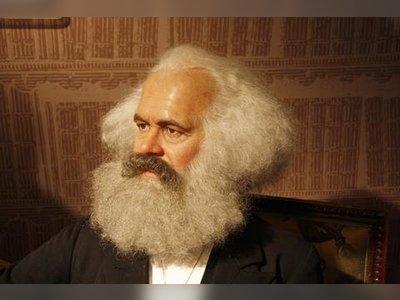British Heritage
Remember, Cherish, Learn.
beta
Ronald Coase - "the greatest of the University of Chicago economists"
Contribution of Ronald Coase to British Heritage.
Ronald Harry Coase, a British economist and author, made significant contributions to British heritage through his groundbreaking work in the field of economics. Born on December 29, 1910, in Willesden, a suburb of London, Coase's intellectual journey paved the way for a deeper understanding of real-world wealth creation and the functioning of markets. His influence extended far beyond academia, as his ideas resonated with policymakers and economists worldwide.
Coase's legacy rests on two seminal articles that have shaped economic thought and influenced policy decisions. In 1937, he published "The Nature of the Firm," a short but highly influential essay that delved into the dynamics of business firms. Coase questioned why the economy featured firms instead of solely relying on independent individuals contracting with each other. He introduced the concept of transaction costs to explain the nature and limits of firms, highlighting how these costs influenced the decision to hire employees rather than contracting out tasks.
His second groundbreaking article, "The Problem of Social Cost," published in 1960, explored the issue of externalities and property rights. Coase argued that the initial assignment of property rights could determine the economically efficient outcome in cases of externalities. This idea, known as the Coase theorem, had a profound impact on the understanding of how to address externalities and allocate property rights efficiently.
Coase's works reshaped the field of law and economics, and he became a central figure in its development. He believed that understanding the influence of the legal system on the economic system was essential for comprehensive economic analysis. His role in founding the Journal of Law and Economics at the University of Chicago provided a platform for research in this interdisciplinary area, further cementing his impact on the subject.
Ronald Coase's contributions to British heritage lie in his intellectual achievements and his representation of British talent on the global stage. As a British economist, Coase brought pride to his home country through his recognition as a leading figure in the field of economics. His receipt of the Nobel Memorial Prize in Economic Sciences in 1991 was a testament to the excellence of British economists and their ability to contribute significantly to economic theory and policy.
Coase's intellectual journey also reflects the value of education and academic institutions in Britain. He attended the London School of Economics and later visited the University of Chicago on a scholarship, which laid the foundation for his influential career. His experiences at these institutions showcased the significance of fostering an environment that encourages rigorous research and critical thinking.
Moreover, Coase's contributions to economics enriched the understanding of market mechanisms and the role of institutions in shaping economic outcomes. His work has been integrated into economic curricula worldwide, including those in British universities, perpetuating his legacy and promoting a deeper understanding of economics among future generations.
Ronald Coase's success as an economist can be measured by the lasting impact of his ideas and their widespread adoption by scholars and policymakers alike. The Nobel Prize in Economic Sciences, awarded to Coase in 1991, solidified his status as a leading thinker in the field. His nomination and receipt of this prestigious award highlighted his significant contributions to economic theory and their practical applications.
Furthermore, Coase's recognition as "the greatest of the many great University of Chicago economists" by Forbes underscores the esteem in which he was held by his peers and the academic community. His work left an indelible mark on the University of Chicago, where he spent much of his career, further enhancing the institution's reputation as a hub of economic scholarship.
Ronald Harry Coase was born on December 29, 1910, in Willesden, a suburb of London, to Henry Joseph Coase and Rosalie Elizabeth Coase. Overcoming challenges in his early years, including a physical weakness in his legs, Coase displayed remarkable determination and academic prowess. He attended Kilburn Grammar School on scholarship and later pursued studies at the London School of Economics.
Coase's intellectual journey led him to the University of Chicago, where he made significant contributions to economic theory and the field of law and economics. His pioneering works, "The Nature of the Firm" and "The Problem of Social Cost," revolutionized economic thought and shaped the understanding of market dynamics and the role of institutions.
Throughout his career, Coase's commitment to rigorous research and intellectual curiosity earned him widespread recognition and respect. His impact extended beyond academia, as his ideas influenced economic policies and regulations worldwide.
In 2012, Coase published "How China Became Capitalist," a testament to his continued intellectual vigor even as he approached his 100th birthday. He was married to Marion Ruth Hartung for 75 years until her passing in 2012, making them one of the longest-married Nobel Prize laureates.
Ronald Coase's profound contributions to economics and law continue to inspire scholars and policymakers, and his intellectual legacy remains a cornerstone of economic thought in the modern world.
Legacy and Impact
Coase's legacy rests on two seminal articles that have shaped economic thought and influenced policy decisions. In 1937, he published "The Nature of the Firm," a short but highly influential essay that delved into the dynamics of business firms. Coase questioned why the economy featured firms instead of solely relying on independent individuals contracting with each other. He introduced the concept of transaction costs to explain the nature and limits of firms, highlighting how these costs influenced the decision to hire employees rather than contracting out tasks.
His second groundbreaking article, "The Problem of Social Cost," published in 1960, explored the issue of externalities and property rights. Coase argued that the initial assignment of property rights could determine the economically efficient outcome in cases of externalities. This idea, known as the Coase theorem, had a profound impact on the understanding of how to address externalities and allocate property rights efficiently.
Coase's works reshaped the field of law and economics, and he became a central figure in its development. He believed that understanding the influence of the legal system on the economic system was essential for comprehensive economic analysis. His role in founding the Journal of Law and Economics at the University of Chicago provided a platform for research in this interdisciplinary area, further cementing his impact on the subject.
Contribution to British Heritage
Ronald Coase's contributions to British heritage lie in his intellectual achievements and his representation of British talent on the global stage. As a British economist, Coase brought pride to his home country through his recognition as a leading figure in the field of economics. His receipt of the Nobel Memorial Prize in Economic Sciences in 1991 was a testament to the excellence of British economists and their ability to contribute significantly to economic theory and policy.
Coase's intellectual journey also reflects the value of education and academic institutions in Britain. He attended the London School of Economics and later visited the University of Chicago on a scholarship, which laid the foundation for his influential career. His experiences at these institutions showcased the significance of fostering an environment that encourages rigorous research and critical thinking.
Moreover, Coase's contributions to economics enriched the understanding of market mechanisms and the role of institutions in shaping economic outcomes. His work has been integrated into economic curricula worldwide, including those in British universities, perpetuating his legacy and promoting a deeper understanding of economics among future generations.
Success and Recognition
Ronald Coase's success as an economist can be measured by the lasting impact of his ideas and their widespread adoption by scholars and policymakers alike. The Nobel Prize in Economic Sciences, awarded to Coase in 1991, solidified his status as a leading thinker in the field. His nomination and receipt of this prestigious award highlighted his significant contributions to economic theory and their practical applications.
Furthermore, Coase's recognition as "the greatest of the many great University of Chicago economists" by Forbes underscores the esteem in which he was held by his peers and the academic community. His work left an indelible mark on the University of Chicago, where he spent much of his career, further enhancing the institution's reputation as a hub of economic scholarship.
General Information
Ronald Harry Coase was born on December 29, 1910, in Willesden, a suburb of London, to Henry Joseph Coase and Rosalie Elizabeth Coase. Overcoming challenges in his early years, including a physical weakness in his legs, Coase displayed remarkable determination and academic prowess. He attended Kilburn Grammar School on scholarship and later pursued studies at the London School of Economics.
Coase's intellectual journey led him to the University of Chicago, where he made significant contributions to economic theory and the field of law and economics. His pioneering works, "The Nature of the Firm" and "The Problem of Social Cost," revolutionized economic thought and shaped the understanding of market dynamics and the role of institutions.
Throughout his career, Coase's commitment to rigorous research and intellectual curiosity earned him widespread recognition and respect. His impact extended beyond academia, as his ideas influenced economic policies and regulations worldwide.
In 2012, Coase published "How China Became Capitalist," a testament to his continued intellectual vigor even as he approached his 100th birthday. He was married to Marion Ruth Hartung for 75 years until her passing in 2012, making them one of the longest-married Nobel Prize laureates.
Ronald Coase's profound contributions to economics and law continue to inspire scholars and policymakers, and his intellectual legacy remains a cornerstone of economic thought in the modern world.
- Ronald Coaseen.wikipedia.org
